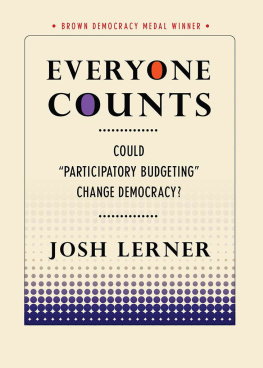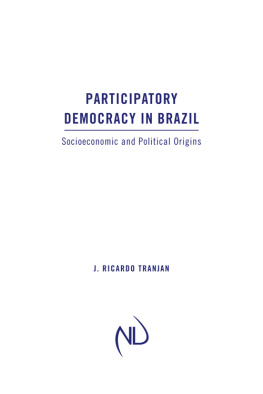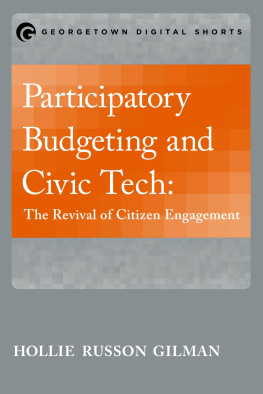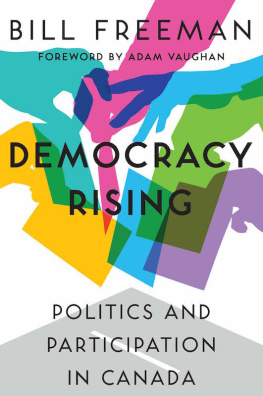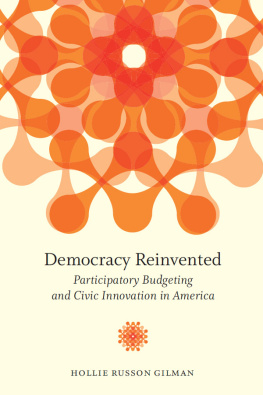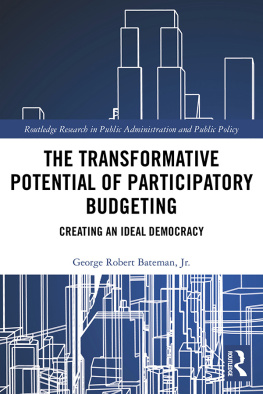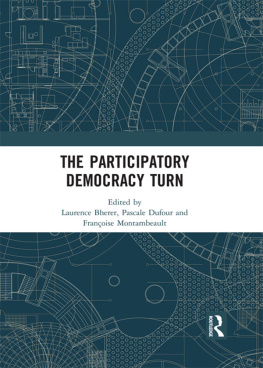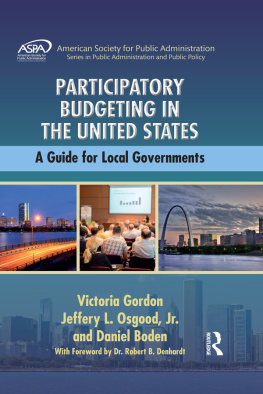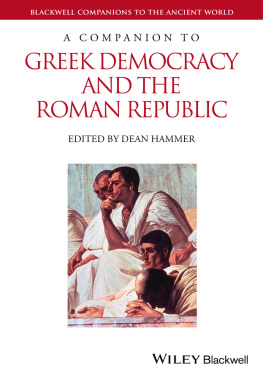MCCOURTNEY INSTITUTE FOR DEMOCRACY
The Pennsylvania State Universitys McCourtney Institute for Democracy (http://democracyinstitute.la.psu.edu) was founded in 2012 as an interdisciplinary center for research, teaching, and outreach on democracy. The institute coordinates innovative programs and projects in collaboration with the Center for American Political Responsiveness and the Center for Democratic Deliberation.
LAURENCE AND LYNNE BROWN DEMOCRACY MEDAL
The Laurence and Lynne Brown Democracy Medal recognizes outstanding individuals, groups, and organizations that produce exceptional innovations to further democracy in the United States or around the world. In even numbered years, the medal spotlights practical innovations, such as new institutions, laws, technologies, or movements that advance the cause of democracy. Awards given in odd-numbered years highlight advances in democratic theory that enrich philosophical conceptions of democracy or empirical models of democratic behavior, institutions, or systems.
EVERYONE
COUNTS
COULD PARTICIPATORY BUDGETING CHANGE DEMOCRACY?
JOSH LERNER
CORNELL SELECTS
an imprint of
CORNELL UNIVERSITY PRESS
Ithaca & London
EVERYONE COUNTS
Could Participatory Budgeting Change Democracy?
W hen a politician has held office for seventeen years, theyve probably done a lot right. But when that same politician suddenly faces a bruising runoff election, chances are theyve done something terribly wrong. In 2007, Chicago alderman Joe Moore was rapidly becoming one more example of our mounting frustrations with government. The Participatory Budgeting Project, headquartered in Brooklyn, New York, stepped in to transform disillusioned voters into a new movement to reinvent democracy in Chicago and beyond .
For more than a decade, Moore was a rising star on the city council. He led the charge to secure living wages for big box store employees. He also gained acclaim for championing environmental regulations on coal-fired power plants and for a resolution against the war in Iraq. But in the 2007 election, Moore was in trouble. No, he hadnt been accused of corruption. (Historically, more Chicago aldermen have gone to jail than into higher office.) Instead, hed done something all too ordinary: Hed lost touch with his constituents.
This problem should sound familiar. Trust in government has plummeted across the United States, sinking below 20 percent by some metrics. What makes Moores story special, however, is its resolution. When voters no longer trust a politician, they usually elect a replacement. Once they lose trust in that person, the cycle repeats.
Moore was fortunate to win his runoffsqueaking by with 51.6 percent of the vote. After the election, he set out to regain his constituents confidence. He enlisted my organization, the Participatory Budgeting Project, to try something radical. Handing the power of the purse back to the community, we invited residents of his ward to decide how to spend a portion of their taxes through a $1.3 million experiment in participatory budgeting. Instead of changing the person at the top, we would try to change the democratic system itself.
THIS IS WHAT DEMOCRACY LOOKS LIKE?
Oddly, as much as we gripe about politicians, most Americans still consider the United States a model for democracy. We have open elections for everything from president to district court judges. We have a free press that covers elections from every angle imaginable. We extol the virtues of voting, and the power of being able to choose our leaders. Parties across the political spectrum champion democracy, as do movements from the Tea Party to Occupy Wall Street.
Though US citizens love democracy in theory, we often hate it in practice. We deeply distrust elected officials, vote at low rates, and increasingly seek to downsize government. Democracy has become the political version of kale: Almost everyone says it is good, but few want to eat it.
Our problem is not with democracy as a concept. A national survey in 2006 found that more than four-fifths of US voters expressed interest in participating in a deliberative political meeting where they could discuss solutions for pressing public problems. Younger people, racial minorities, and those with lower incomes were among the most eager to attend.
In practice, though, invitations into public life often amount to little more than clicking on an online petition or enduring hours of scripted three-minute deputations at a zoning hearing. We need better opportunities to participate in ways that are personal, effective, and engaging.
Fortunately, democracy is not a static concept. In recent decades, visionaries have developed new ways to engage the public. These include 21st Century Town Meetings that engage thousands of people, Citizens Initiative Reviews of ballot measures in Oregon, and Deliberative Polls that have yielded more informed public opinions in countries across the globe.
These particular processes are novel, but the United States has a long history of participatory democracy. For centuries, small town residents in New England and elsewhere have come together in town meetings to make fiscal and policy decisions. Many of todays innovations strive to scale up and expand public deliberation. So far, however, most of these experiments have lacked something vital in politicspower.
MONEY TALKS
When I first heard of participatory budgeting, it did not sound particularly powerful. I was at the University of Toronto, on a questlike many an eager grad studentfor that mind-blowing new idea that would change everything , or at least change how people could participate in government.
First, I turned to technology for solutions. If our centuries-old political institutions were ailing, perhaps a dose of modern technology could reinvigorate them. If people were indifferent to public meetings and polling stations, perhaps they would show up for something else online. Logging into a discussion forum on the internet was much easier than finding ones way to a municipal building or library for a public gathering. Meeting online entailed no travel or childcare costs, and it required a smaller portion of ones scarce free time. Online participation also could deliver rich data to people and help them reach more thoughtful judgments.
But there was a problem. The people who actually participate in online forums tend to be affluent and whitethe same people who already have the loudest voices in politics. Researchers have found that this digital divide persists even as we all become more tech-savvy. Focusing primarily on online participation would likely widen the power gap that already exists.
So I began to search for participatory processes that excited the people normally underrepresented in politics, such as less affluent citizens and people of color. My professors suggested that I take a look at participatory budgeting (PB). PB did not sound exciting. But despite its dull veneer, I gave it a chance.
I attended my first PB session at a University of Toronto conference. Expecting to hear presentations from researchers and experts, I instead found myself watching a skit put on by a handful of public housing tenants. In twenty minutes, they reenacted a year of PB meetings. It was messy, confusing, and absolutely fascinating.





